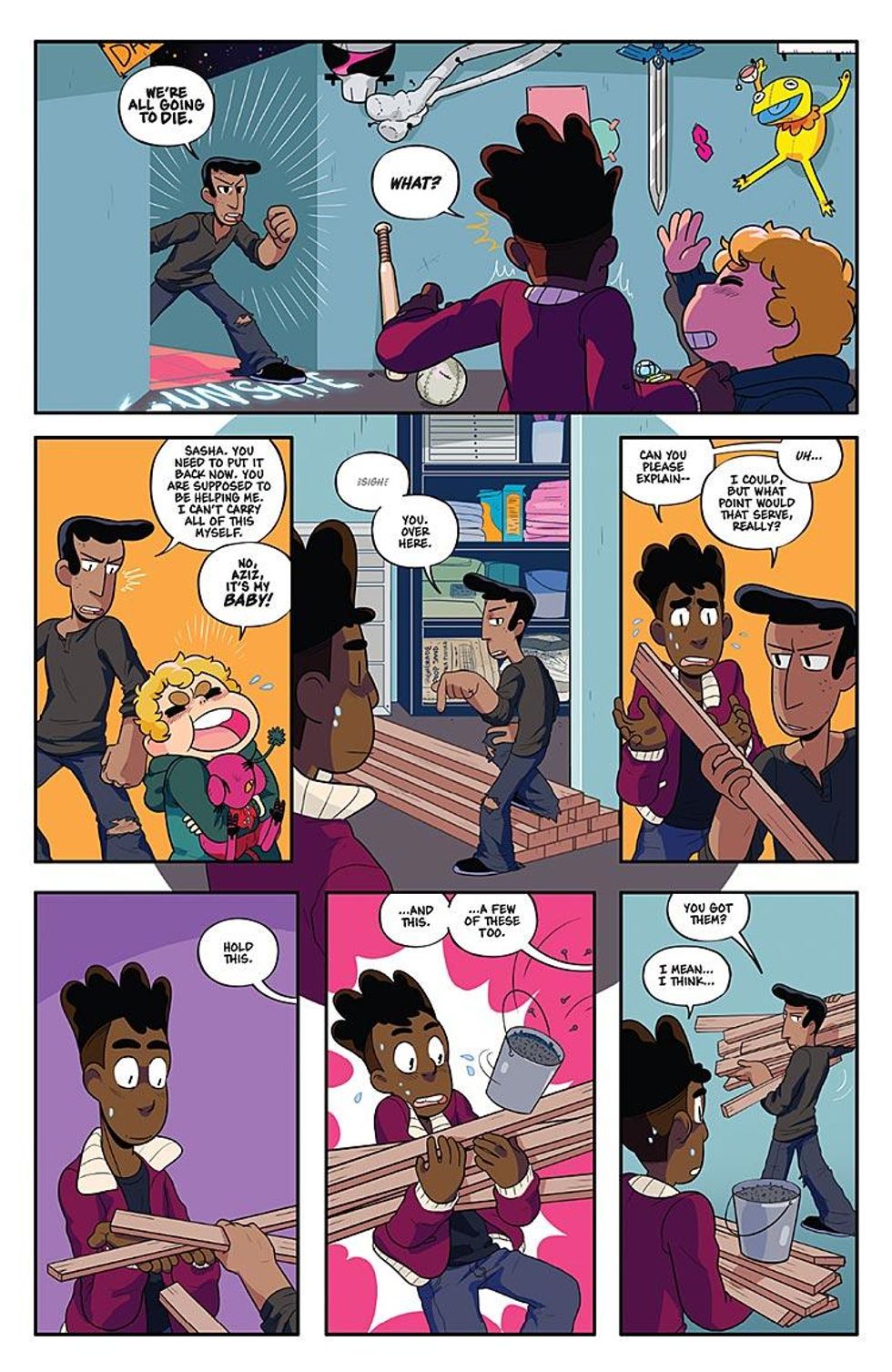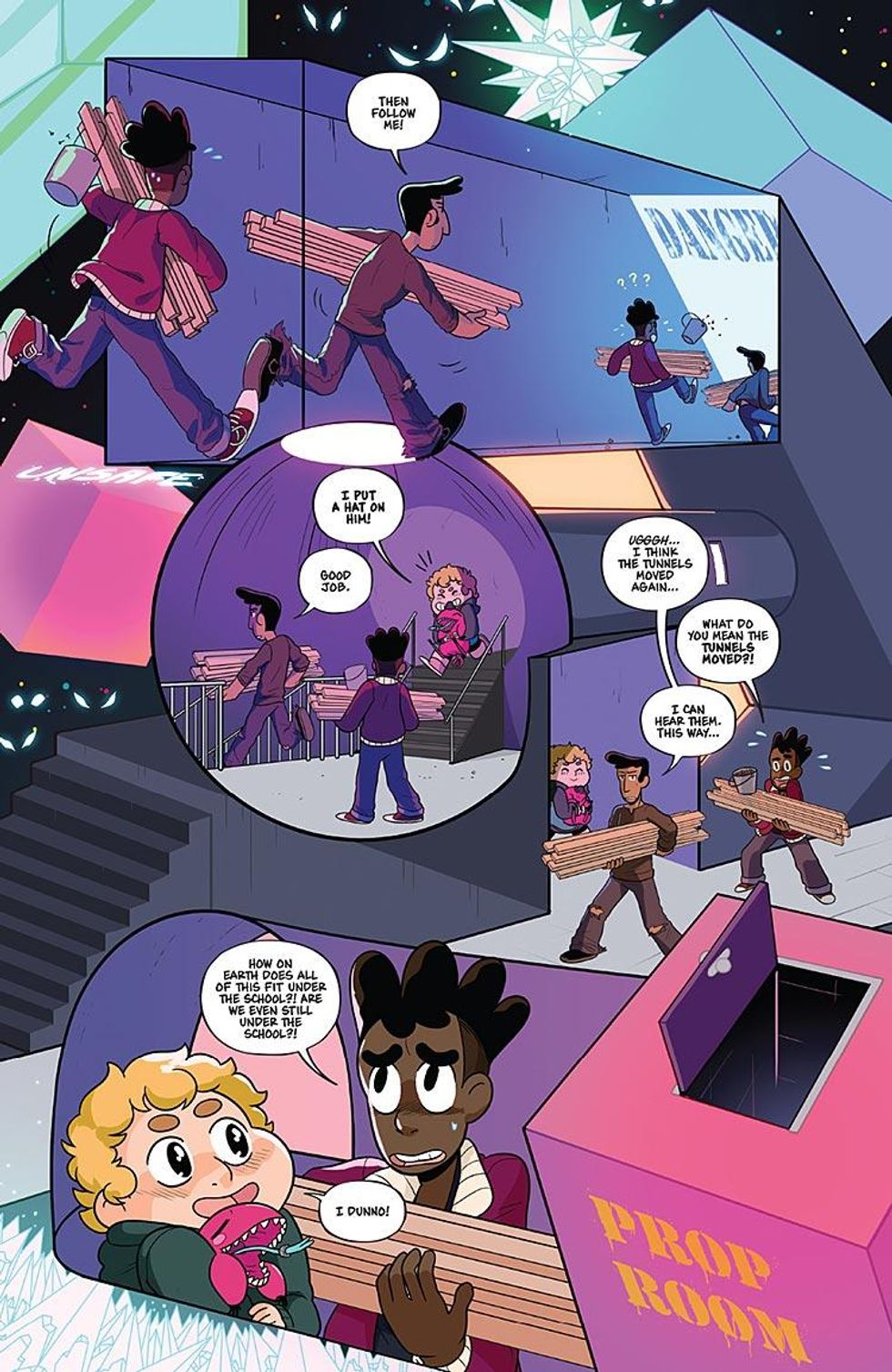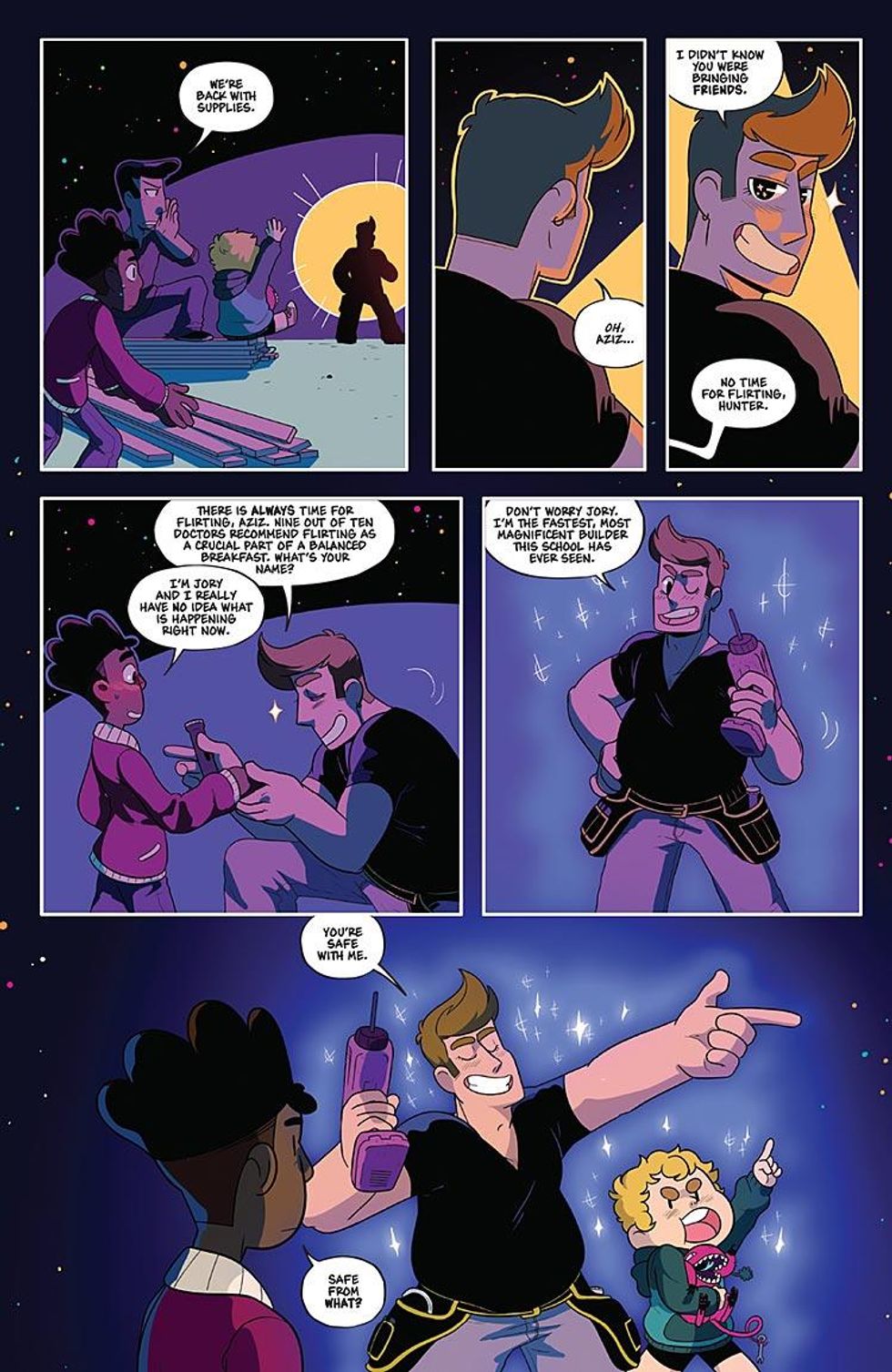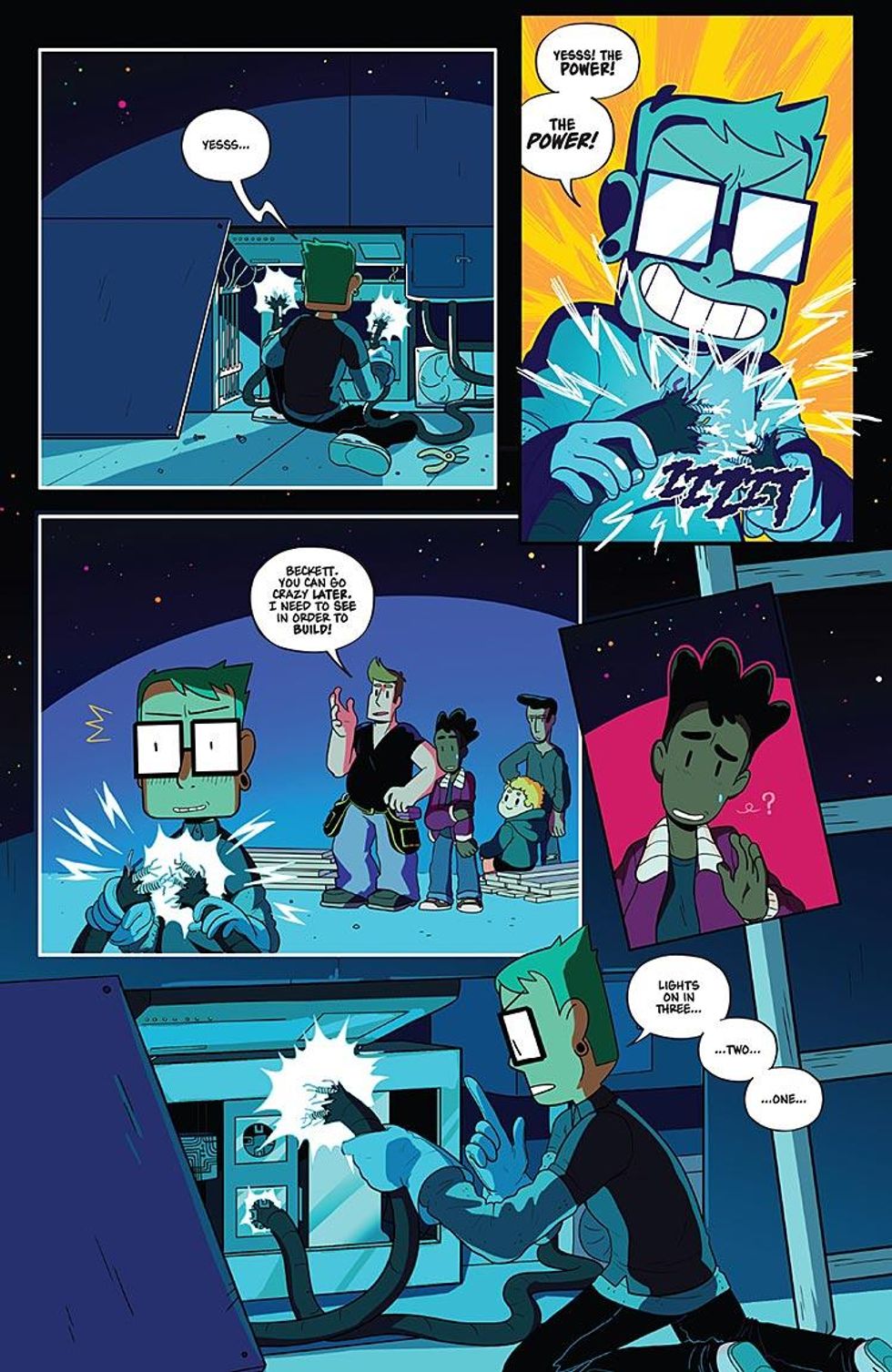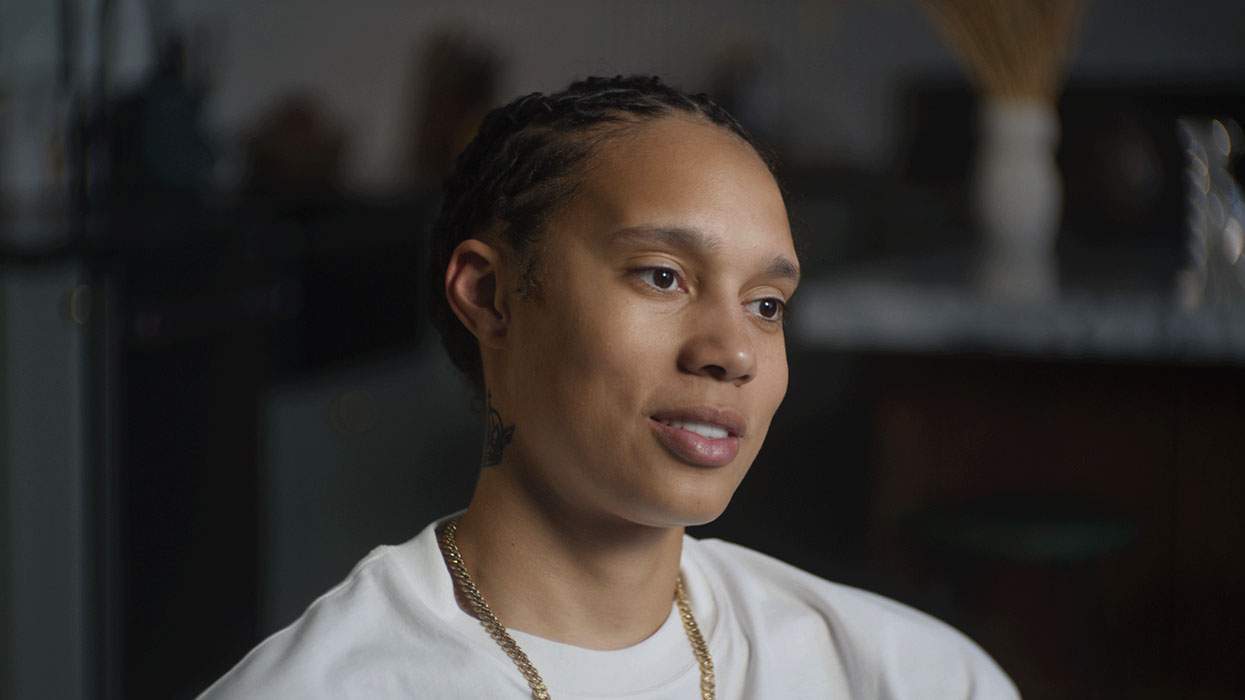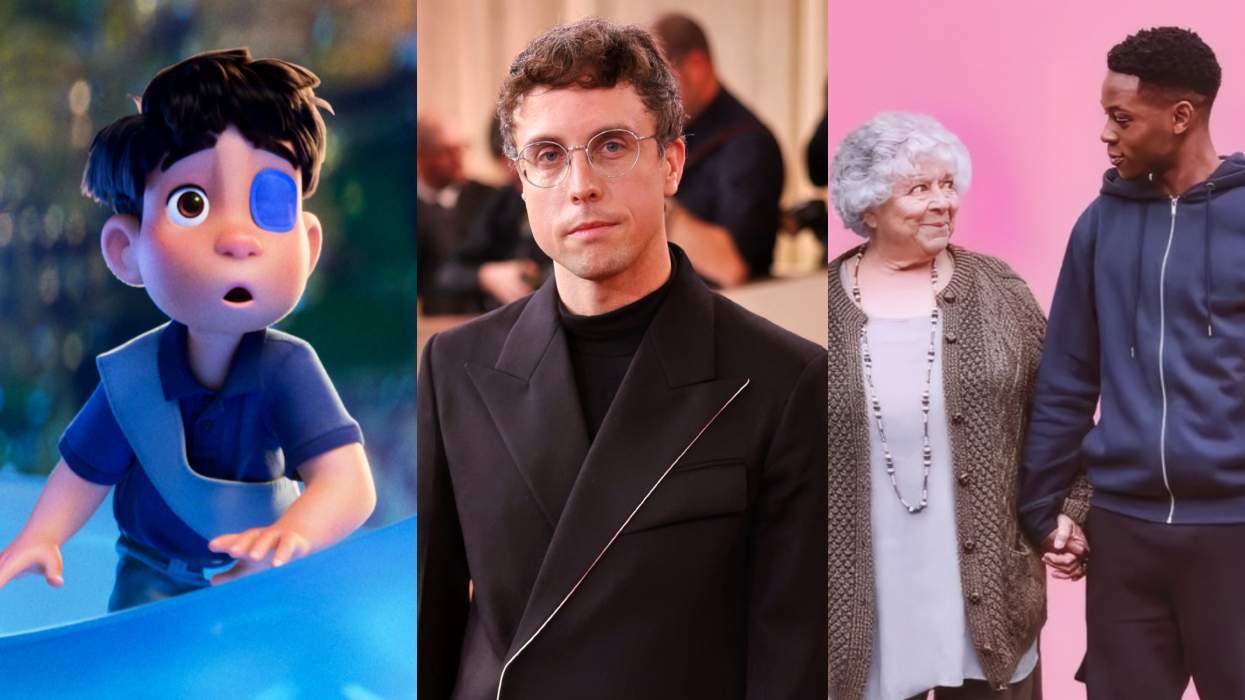Celebrating kids outside the norm is what the creators of Boom! Studios' new series The Backstagers proudly aims to do. Created by bi writer James Tynion IV and trans artist Rian Sygh, The Backstagers is an all-ages story about the behind-the-scenes adventures of a high school stage crew.
The comic book series is unabashedly queer, filled with gay, bi, and trans characters. It's also magical, with a doorway to another world. And it's completely and totally delightful. It's a book that gives a positive voice to both "the weirdos" found in a high school drama club as well as those with alternative sexualities and identities.
The Advocate happily chatted with both Tynion and Sygh to get the scoop on their joyful new series, out today, their own high school experiences, and their love of shojo manga. Plus we offer an exclusive preview of issue 1!
The Advocate: Tell us a little about the comic.
Tynion: The Backstagers is an all-ages comic about a group of outcasts and weirdos becoming friends in the impossible, magic world behind the curtain of their high school theater. If you're a theater person, you probably know the exact people I'm talking about, but if you're not, the stage crew are the invisible people working on and behind the stage to build the sets, change the scenery, control the lights, and make the props.
When they talk about the magic of the stage, the stage crew is the people bringing the magic to life. And this book makes that magic literal. When the actors ask for a prop, these kids need to move through hallways that change directions every time they don't look, hide from strange noises and monsters in the dark, and figure out how to bring something impossible and magic back to the stage for the actors to pull the show off.
They never get the applause or the thanks they deserve, and they certainly aren't the most normal people in their high school, but they love doing what they do, and they love doing it together.
Sygh: It's a book about community, friendship, emotions, anxiety, disappointment, fear, healing, clowns(??), magic, adventure, rivalry, mysteries, crushes, impossibilities, and overcoming them.
You're both openly queer, does this impact the narrative in the story? Does it make a difference?
Tynion: Yes. Absolutely yes. While we were talking the other day, I mentioned that there's only one definitely straight character in the series, and Rian's reaction was, "We have a straight character?!"
Queerness is baked into the heart of this series and is pretty deliberately one of its main goals. The comics industry has been blessed in the last few years to get a whole plethora of all-ages comics, and all-ages comics with queer characters in particular, but one place that I saw was lacking was representation of the different types of queer boys that exist in the world.
There are still only a couple of archetypes that get used over and over, and none of those archetypes have ever fully represented the kind of young queer kid I was in high school. Kids, more than anyone, use fiction to figure themselves out, and when they can't find themselves in the media they consume, they don't feel like they have a place in the world. So we wanted to show them they do have a place. We wanted to write the book we desperately needed when we were young, queer, and didn't feel like we belonged.
Sygh: I don't think it's possible for creatives to make stories that aren't impacted by their own identities. In The Backstagers every facet of this world we've made is influenced by our shared experiences. Growing up is already hard enough, but realizing at a young age that you're inherently different from the people around you -- it's terrifying.
We wanted to make sure that those kids coming to terms with their true selves had a mirror of their experiences somewhere. We wanted to reflect those very real developing identities as something positive and accessible.
When I was growing up I didn't even know someone my age could be gay or transgender; that's a problem! What we wanted to do from the beginning was give queer kids who maybe don't see themselves reflected in the "gay best friend" tropes a place to see themselves belonging and thriving.
This comic feels a bit like a classic '80s teen movie. Was this a goal of the series?
Tynion: I think that teen movies get a lot of credit for defining the tropes that we all use to understand (and cope with) high school, so I'm sure there's a little bit of that in there. It's particularly there in the relationship between the two main actors in the story, Blake and Kevin McQueen, who are basically in the "mean jock" role, despite the fact that they'd be the opposite in any other teen adventure series.
More than that, though, and I think this will become a lot more obvious as the series moves forward, Rian and I take a lot of influence from shojo manga. Those stories all tend to be rooted in soap opera and romance, leaning hard into melodrama and extreme emotions in a way teen dramas tend to shy away from.
Sygh: I actually never really liked the "teen movie" genre. I can't think of a single one that didn't bore me to tears or seemed even a little bit relatable. If I were to liken it to another piece of media, James hit the nail on the head with shojo manga.
I unashamedly adore shojo manga -- even the bad ones! -- as an art form because it's so incredibly unique. The emphasis is always on the drama, romance, and emotions; it's a media that's overwhelmingly character-driven, and the vehicle is made of sparkles and inexplicable flowers. The Backstagers' aesthetic is a meld of my love for unnecessary sparkles and my admiration of indie-style cartooning.
Finding a sense of community when you're outside the "norm" is a key theme in the book. Is this an autobiographical theme?
Tynion: I was in eighth grade when I came out, and it did not go all that well. Not entirely because of the friends I lost, though I certainly lost friends, but more because I felt like I lost a piece of myself. I was trying to find myself in this new queer definition, and I thought I had to be a certain kind of person. I tried being a kind of stereotype, and I hated myself doing it, so instead I shut down. I thought I was broken in a real way, that I would never find people like me. That I'd never have friends.
The next year, I started freshman year at an all-boys Catholic high school, and I had never felt more alone in my life. I couldn't see anybody like me, and I looked for them. I tried joining theater, which felt like the kind of fringe where I could thrive, but even there I was the awkward geeky kid without any real stage presence.
I'd kind of doomed myself to a friendless high school experience when my stepsister's ex-boyfriend dragged me to the first stage crew meeting of the school year. That's where I found my first real friends, because we were all weirdos -- none of us had anyone else like us in the school. They didn't care that they didn't fit into a specific role, because we could be weirdos together.
So yes, this is definitely an autobiographical theme. The idea of finding community through being outcast was a very important part of growing up for me and for a lot of queer people, I think. Hell, a lot of people in general. It was the heart of what we wanted to explore in this series.
Sygh: My school experience would take a book and a half to explain, but a long story short, it was unconventional and turbulent. I don't think I ever really "fit in" even when I was a part of the weird kids cliques. A lot of the reason why was in my own shortcomings. I was incredibly anxious, wholly depressed, and more than anything, angry and scared of the person I now know myself to be. The Backstagers is almost like rewriting that difficult experience.
I'm helping create this incredible group of kids that stick together regardless of their particularities or identities. In a way, I'm writing the exact story I wish I had been able to live. A story that focuses primarily on found family, loving support, and complete acceptance of who these kids are in the face of the unknown, dangerous, and downright terrifying.
Being an all-ages comic, how do you approach a queer character(s) in your series? James, is there a difference to how you write LGBT characters in all-ages comics versus a more mature comic book series?
Tynion: There's this horrible misconception out in the world that queer characters shouldn't be in all-ages content, because queer content is inherently mature. That sexuality implies sex and is inappropriate to address on the screen. Which, frankly, is ludicrous.
Kids have crushes on each other. Kids are attracted to each other and struggle with their identities. They need to understand that there are people out there like them. So if there's a difference between writing Hunter and Beckett in this series and writing a character like Batwoman in Detective Comics, it's being conscious that somebody might be using The Backstagers to figure themselves out at a young age. You want to serve the reader that way. Make the characters understandable and relatable so you can step into their shoes.
There are also negative situations Rian and I wanted to avoid outright. We won't be dealing with homophobia or transphobia in the book; we wanted this to be a world in which queerness was inherent. There is conflict, and some characters won't like other characters, but their queerness will never be at the heart of it. It's making sure that nobody who relates to a character in the series will feel like the series is telling them they're wrong to relate to them.
Sygh: I would just like to add how ridiculous it is that it's 2016 and I can count the amount of overtly queer-friendly kids' media on one hand.
Tease us with what's to come?
Tynion: Honestly, with the first issue setting up the status quo of the book, I'm most excited about people getting to know our characters by seeing them interact and get into trouble together. The issue I think Rian and I are most excited by is our third issue, which digs into Beckett, our high-strung transgender co-lead of the book. It covers trying to overcome social anxiety in order to do right by your friends. Those are the kind of stories this book was built to tell, and I can't wait until everyone gets to read them.
Sygh: Y'all don't even know how good issue 3 is yet!! I'm so incredibly excited about it, perhaps in part by its emphasis on Beckett. Out of all the characters, I think I have the strongest emotional attachment to him, as he reflects myself the most.
However, James did make me draw a lot of clowns. So maybe issue 2 was better...
For more on The Backstagers click here.

